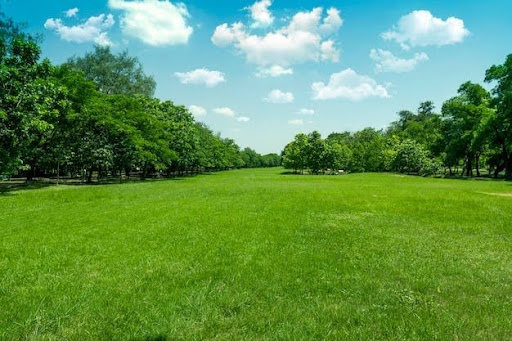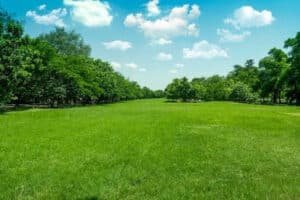Maintaining a lush and vibrant lawn in North Richland Hills, TX, requires an understanding of the region’s unique climate and soil conditions. This guide will provide actionable tips and insights to help you achieve a healthy yard that thrives year-round. Below, we’ll cover essential topics such as proper mowing, soil testing, amendments, and seasonal treatments to combat common challenges like pests and diseases.
Understanding North Richland Hills’ Climate and Soil
North Richland Hills falls within the humid subtropical climate zone, which means hot summers and mild winters. The region’s soil is primarily a mix of clay and sandy loam, which can pose challenges for water retention and root growth.
Key Considerations for Lawn Care in This Region
- Seasonal temperature fluctuations affect lawn care routines.
- The clay-heavy soil requires specific amendments for optimal plant health.
- Common pests, such as chinch bugs and grubs, thrive in these conditions and require vigilance.
Proper Mowing Techniques
- Set the correct mower height:
- For warm-season grasses like Bermuda or St. Augustine, maintain a height of 1.5 to 2.5 inches.
- Avoid cutting more than one-third of the grass blade at a time to prevent stress.
- Keep mower blades sharp:
- Dull blades tear the grass, leaving it vulnerable to diseases.
- Sharpen blades every 20-25 hours of mowing.
- Mow at the right frequency:
- During peak growing seasons (spring and early summer), mow weekly.
- In the cooler months, mow less frequently as growth slows.
Soil Testing and Amendments
Healthy lawns begin with healthy soil. Understanding your soil’s composition allows you to provide the nutrients your lawn needs. Here’s how to approach soil testing and amendments in North Richland Hills TX.
Soil Testing Steps
- Collect samples from various spots in your yard.
- Send the samples to a local extension service or soil testing lab.
- Review the results for pH levels, nutrient deficiencies, and organic matter content.
Common Soil Amendments
- Lime or sulfur: Adjusts pH levels to the ideal range for grass (6.0 to 7.0).
- Compost: Adds organic matter and improves clay soil structure.
- Fertilizers: Select a balanced fertilizer with nitrogen, phosphorus, and potassium based on soil test results.
Timing Lawn Treatments
Applying treatments at the right time ensures they’re most effective. In North Richland Hills, focus on the following timing strategies:
Fertilization Schedule
- Spring: Apply a pre-emergent herbicide and a nitrogen-rich fertilizer to kickstart growth.
- Summer: Use a slow-release fertilizer to maintain health during heat stress.
- Fall: Feed the lawn with a winterizer fertilizer to strengthen roots for the colder months.
Pest and Disease Prevention
- Inspect your lawn regularly for signs of pests like grubs or diseases like brown patch.
- Apply treatments such as:
- Grub control: Early summer applications work best.
- Fungicides: Use preventatively in late spring to early summer.
Seasonal Watering Practices
Proper watering is critical for maintaining lawn health in the hot summers and cooler winters of North Richland Hills. Follow these watering tips to keep your yard hydrated without overdoing it:
- Water deeply but infrequently:
- Aim for 1-1.5 inches of water per week, including rainfall.
- Water early in the morning to reduce evaporation.
- Adapt to seasonal needs:
- Increase watering during summer droughts.
- Reduce watering in winter when growth slows.
- Check irrigation systems:
- Inspect sprinklers regularly for clogs or leaks to ensure even water distribution.
Combatting Common Lawn Problems
Lawns in North Richland Hills face specific challenges due to the climate and soil. Here’s how to address them:
Pests
- Chinch bugs:
- Look for yellowing patches that spread quickly.
- Treat with insecticides labeled for chinch bug control.
- Grubs:
- Check for spongy turf and brown patches.
- Use granular grub control products in late spring.
Diseases
- Brown patch:
- Common in warm, humid conditions.
- Prevent by avoiding overwatering and using fungicides as needed.
- Dollar spot:
- Causes small, straw-colored spots.
- Treat with a nitrogen-rich fertilizer and fungicides.
Expert Tips for Year-Round Lawn Care
- Aerate annually:
- Aeration relieves soil compaction and improves water absorption.
- Best done in early spring or fall.
- Overseed in fall:
- Overseeding helps fill in bare spots and maintain density.
- Use cool-season grass seeds like fescue for added resilience.
- Mulch clippings:
- Leave grass clippings on the lawn to return nutrients to the soil.
Maintaining a healthy yard in North Richland Hills, TX, requires consistent care and attention to the region’s specific challenges. Goat Kings is knowledgeable about All arenas in North texas. By following these tips—from proper mowing techniques to seasonal treatments—you can enjoy a lush, resilient lawn throughout the year. For more personalized guidance, consult local experts like Goat Kings for professional advice tailored to your yard’s needs.


